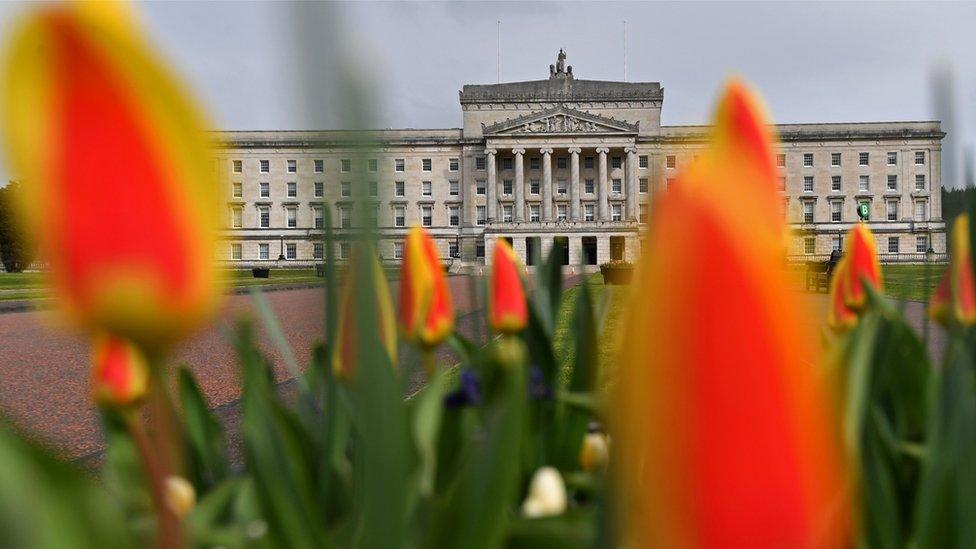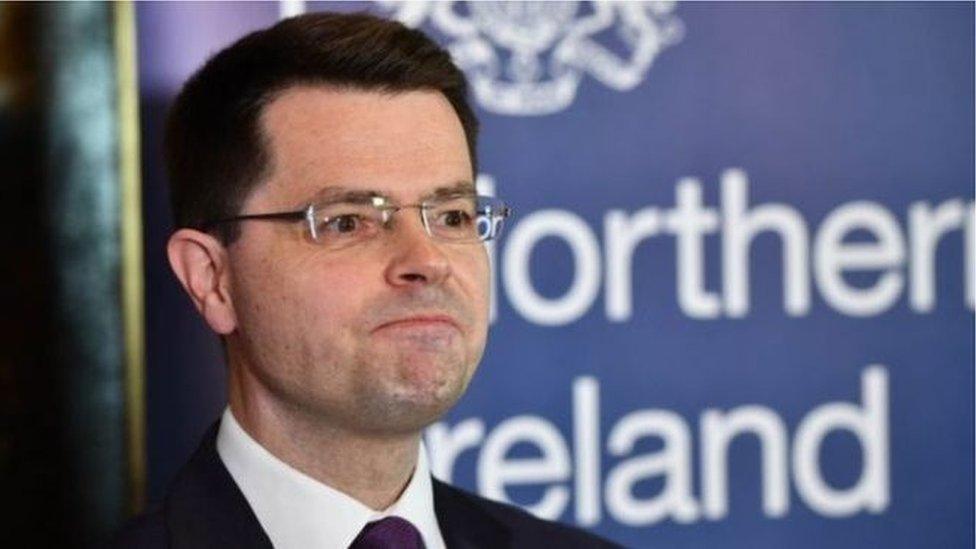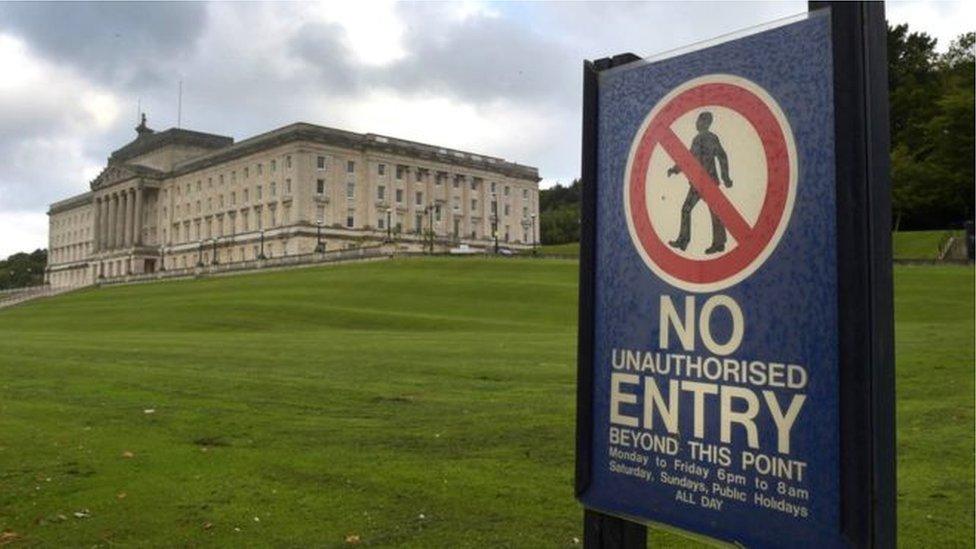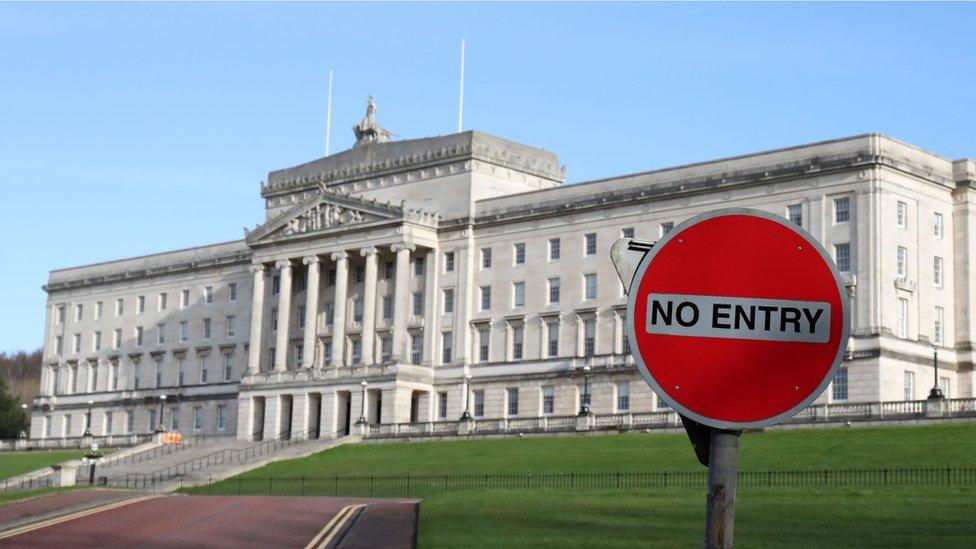Stormont talks: Direct rule or election 'if no deal'
- Published

The Northern Ireland Assembly remains in cold storage awaiting a deal between the parties
Northern Ireland could face direct rule, or another election if no agreement is reached by early May, James Brokenshire has warned.
The secretary of state said discussions would "pause" for Easter.
Stormont's parties have yet to strike a deal to form an executive almost six weeks after the assembly election.
Meanwhile, DUP leader Arlene Foster says she will contact Irish language speakers, saying she wants to better understand those who love the language.
Issues including the Irish language and the legacy of the Troubles are seen as the main sticking points in the current talks.
On Wednesday, Mr Brokenshire said: "If no executive is formed by early May, I will need to take further steps to ensure Northern Ireland has the political stability it needs.
"This is likely to mean, however undesirable, either a second election or a return to decision making from Westminster."
Critical issues
In his statement, Mr Brokenshire said the restoration of devolution remained achievable, but "more time and a more focused engagement on the critical issues are required".
Irish Foreign Minister Charlie Flanagan, who has been involved in the talks, welcomed the secretary of state's statement.
"In particular, at this critical and challenging time for Northern Ireland as we approach negotiations on the UK's withdrawal from the EU, the restoration of a power-sharing executive is essential," he said.

The secretary of state said discussions would "pause" for Easter
Sinn Féin leader Gerry Adams said the institutions could only operate "on the basis of rights, and that's rights for everybody ".
He said the impasse "could be sorted out by nine o'clock tonight" if that were recognised.
Asked whether there could be a deal, Mr Adams said: "The optimism of the heart always has to overcome the pessimism of the mind."
DUP leader Arlene Foster said she felt there had been "good engagement" and she emphasised the cultural aspect of the talks.
The former first minister said she intended to "listen to and engage with those from the Gaelic Irish background, those without the party political background".
This would encompass "people who genuinely love the Irish language and don't want to use it as a political weapon".
Irish language group Pobal said it would "gladly accept" Mrs Foster's invitation to meet with Irish speakers and it had written to Mrs Foster to arrange a meeting.

Analysis

Graffiti in Belfast calling for an Irish language act
By Enda McClafferty, BBC NI political correspondent
Many will think this a long way off the Arlene Foster during the election campaign, whenever she made it very clear there would be no Irish Language Act under her watch.
Her party has stressed this is not a change of policy but it was pretty deliberate Arlene Foster putting the information in the public domain that she plans to meet Irish Language groups beyond Sinn Féin, because she wants to hear from those who have no political baggage.
This could be the first step towards clearing the way among her own people, to be able to say we can now make a decision on an Irish Language Act without the influence of, or demands from, Sinn Féin.

SDLP leader Colum Eastwood said he was "furious and frustrated" another deadline had been missed.
"I don't know how I can look at the public out there when I meet them over the next couple of days that once again we have missed another deadline. I don't think it's good enough," he said.
Mr Eastwood also called on the parties to reduce the prominence of their unelected special advisers in the talks.
Ulster Unionist Tom Elliott said the talks had been "extremely frustrating".
He said that at times it felt like "Back to the Future" as the parties returned to matters they discussed three-and-a-half years ago.
Mr Elliott said he feared that "some people are going through the motions".
Snap election
The political deadlock came after a snap election on 2 March brought an end to Stormont's unionist majority and the DUP's lead over Sinn Féin was cut from 10 seats to one.
Under Northern Ireland's power-sharing agreement, the executive must be jointly run by unionists and nationalists, with the largest party putting forward a candidate for first minister.
Sinn Féin's Martin McGuinness quit as deputy first minister in January in protest against the DUP's handling of a botched green energy scheme.
The party said it would not share power with Mrs Foster as first minister until the conclusion of a public inquiry into the Renewable Heat Incentive (RHI) scheme.
Mr McGuinness died last month at the age of 66.
- Published11 April 2017

- Published10 April 2017

- Published27 March 2017
